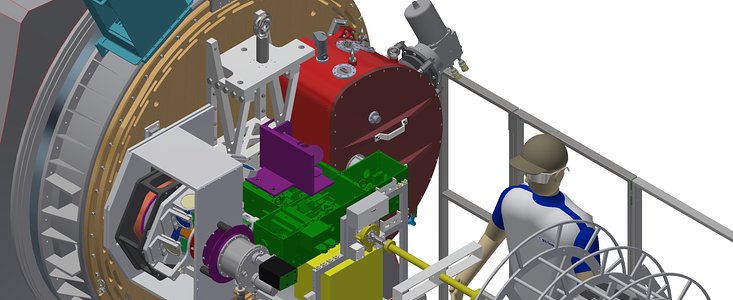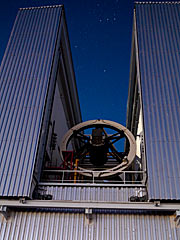Announcement
ESO’s La Silla Observatory to gain cutting-edge SOXS instrument
8 October 2018
ESO has signed an agreement with an international consortium led by INAF, the Italian National Institute for Astrophysics, to build and operate a cutting-edge spectrographic instrument known as Son Of X-shooter, SOXS [1]. Work on this innovative instrument’s design has been underway since 2017, meaning that SOXS could be installed at La Silla as early as 2020.
SOXS will be installed on ESO’s 3.58-metre New Technology Telescope (NTT) at the La Silla Observatory in Chile, replacing SOFI, a venerable and highly productive ESO instrument that has been operating for over 20 years. Designed as a unique spectroscopic facility, SOXS will study transient sources following triggers and alerts from telescopes, satellites, and detectors worldwide.
SOXS will provide vital spectroscopic follow-up observations to many transient surveys, and is poised to become the foremost transient follow-up instrument in the Southern hemisphere. The novel, highly specialized design of the instrument will ensure that it will have almost the same sensitivity as its progenitor, X-shooter, despite being installed on a much smaller telescope.
Transients are astronomical events that — as the name suggests — are only visible for a short period of time. This includes some of the most fascinating astrophysical phenomena, such as supernovae and bursts of gravitational waves. It is critical that these triggers are followed up within hours, if not minutes, by dedicated spectroscopic facilities such as SOXS. Transients are being discovered at an impressive rate that will only be increased by future survey telescopes, making the combination of SOXS and the NTT a much-needed astronomical tool for capturing these fleeting events in wavelengths ranging from ultraviolet to the near-infrared.
From its new home on the NTT at the La Silla Observatory, SOXS will follow up a variety of astronomical transients at all distance scales and from all branches of astronomy. Its targets will include fast alerts from space telescopes (such as gamma-ray bursts) or gravitational wave detectors, mid-term alerts (such as supernovae and X-ray transients), long-term monitoring of variable sources (such as blazars, and cataclysmic binaries), transit spectroscopy of extrasolar planets or one-off events like the close passage of newly discovered minor bodies. As well as its impressive ability to study transients, SOXS will also be able to carry out routine observations of objects which are simply too bright for other instruments like X-shooter to observe.
SOXS is expected to see first light in 2020 and to start operating in 2021. The contract foresees 5 years of operation with a possible extension of another 5 years.
Notes
[1] SOXS (Son of X-shooter) is a development of the X-Shooter instrument installed on the VLT. The SOXS consortium consists of: INAF (Italy), the Weizmann Institute of Science (Israel), Universidad Andrés Bello & Millennium Institute of Astrophysics (Chile), University of Turku & FINCA (Finland), Queen’s University Belfast (UK), Tel Aviv University (Israel), and the Niels Bohr Institute (Denmark).
Links
Contacts
Hans-Ulrich Käufl
ESO
Garching bei München, Germany
Tel: +49 89 3200 6414
Email: hukaufl@eso.org
Sergio Campana
INAF – Osservatorio astronomico di Brera
Via E. Bianchi 46
Merate (LC) – I-23807, Italy
Tel: +39 02 72320418
Email: sergio.campana@brera.inaf.it
Calum Turner
ESO Public Information Officer
Garching bei München, Germany
Tel: +49 89 3200 6670
Cell: +49 151 1537 3591
Email: pio@eso.org
About the Announcement
| Id: | ann18070 |
Our use of Cookies
We use cookies that are essential for accessing our websites and using our services. We also use cookies to analyse, measure and improve our websites’ performance, to enable content sharing via social media and to display media content hosted on third-party platforms.
ESO Cookies Policy
The European Organisation for Astronomical Research in the Southern Hemisphere (ESO) is the pre-eminent intergovernmental science and technology organisation in astronomy. It carries out an ambitious programme focused on the design, construction and operation of powerful ground-based observing facilities for astronomy.
This Cookies Policy is intended to provide clarity by outlining the cookies used on the ESO public websites, their functions, the options you have for controlling them, and the ways you can contact us for additional details.
What are cookies?
Cookies are small pieces of data stored on your device by websites you visit. They serve various purposes, such as remembering login credentials and preferences and enhance your browsing experience.
Categories of cookies we use
Essential cookies (always active): These cookies are strictly necessary for the proper functioning of our website. Without these cookies, the website cannot operate correctly, and certain services, such as logging in or accessing secure areas, may not be available; because they are essential for the website’s operation, they cannot be disabled.
Functional Cookies: These cookies enhance your browsing experience by enabling additional features and personalization, such as remembering your preferences and settings. While not strictly necessary for the website to function, they improve usability and convenience; these cookies are only placed if you provide your consent.
Analytics cookies: These cookies collect information about how visitors interact with our website, such as which pages are visited most often and how users navigate the site. This data helps us improve website performance, optimize content, and enhance the user experience; these cookies are only placed if you provide your consent. We use the following analytics cookies.
Matomo Cookies:
This website uses Matomo (formerly Piwik), an open source software which enables the statistical analysis of website visits. Matomo uses cookies (text files) which are saved on your computer and which allow us to analyze how you use our website. The website user information generated by the cookies will only be saved on the servers of our IT Department. We use this information to analyze www.eso.org visits and to prepare reports on website activities. These data will not be disclosed to third parties.
On behalf of ESO, Matomo will use this information for the purpose of evaluating your use of the website, compiling reports on website activity and providing other services relating to website activity and internet usage.
Matomo cookies settings:
Additional Third-party cookies on ESO websites: some of our pages display content from external providers, e.g. YouTube.
Such third-party services are outside of ESO control and may, at any time, change their terms of service, use of cookies, etc.
YouTube: Some videos on the ESO website are embedded from ESO’s official YouTube channel. We have enabled YouTube’s privacy-enhanced mode, meaning that no cookies are set unless the user actively clicks on the video to play it. Additionally, in this mode, YouTube does not store any personally identifiable cookie data for embedded video playbacks. For more details, please refer to YouTube’s embedding videos information page.
Cookies can also be classified based on the following elements.
Regarding the domain, there are:
- First-party cookies, set by the website you are currently visiting. They are stored by the same domain that you are browsing and are used to enhance your experience on that site;
- Third-party cookies, set by a domain other than the one you are currently visiting.
As for their duration, cookies can be:
- Browser-session cookies, which are deleted when the user closes the browser;
- Stored cookies, which stay on the user's device for a predetermined period of time.
How to manage cookies
Cookie settings: You can modify your cookie choices for the ESO webpages at any time by clicking on the link Cookie settings at the bottom of any page.
In your browser: If you wish to delete cookies or instruct your browser to delete or block cookies by default, please visit the help pages of your browser:
Please be aware that if you delete or decline cookies, certain functionalities of our website may be not be available and your browsing experience may be affected.
You can set most browsers to prevent any cookies being placed on your device, but you may then have to manually adjust some preferences every time you visit a site/page. And some services and functionalities may not work properly at all (e.g. profile logging-in, shop check out).
Updates to the ESO Cookies Policy
The ESO Cookies Policy may be subject to future updates, which will be made available on this page.
Additional information
For any queries related to cookies, please contact: pdprATesoDOTorg.
As ESO public webpages are managed by our Department of Communication, your questions will be dealt with the support of the said Department.


